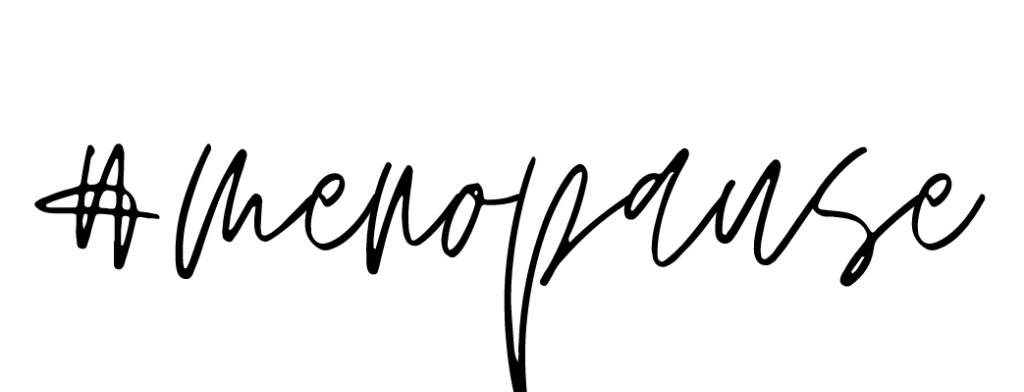Mystery Ailments and Leaving the Workplace
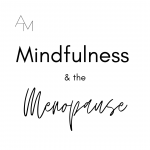 I’m back at home after my trip to the UK. Time for me to settle myself and work on my own needs and health, mental and physical. I have a book to write, some podcasts to record and some studying to do.
I’m back at home after my trip to the UK. Time for me to settle myself and work on my own needs and health, mental and physical. I have a book to write, some podcasts to record and some studying to do.
All of this is subject to the vagaries of my symptoms. I’m losing some weight, so there will be more changes in physical symptoms and mood swings. I need to do it, like many menopausal women I struggle with the constant yo-yo of weight loss and gain. I’m tempted by diet plans, new gimmicks and quick fixes, but all the while I know that I need to manage my nutrition and exercise sensibly. Weight loss happens when your calorie intake is lower than your calorific burn, eating the right food, at the right time and being consistent! This requires a mix of exercise and diet that suits your individual needs, no two people are the same
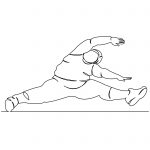 Mental health in the menopause is the same approach, consistency is everything. New neural pathways will only be formed with repetition, mental ‘muscle memory’ if you like. I do not believe that positive thoughts will be the only solution, nor will meditation, or journalling, or medication, or mindful awareness. Like physical health, mental health is dependent on a combined approach, to meet your individual requirements, a mix of methods but applied and adopted consistently.
Mental health in the menopause is the same approach, consistency is everything. New neural pathways will only be formed with repetition, mental ‘muscle memory’ if you like. I do not believe that positive thoughts will be the only solution, nor will meditation, or journalling, or medication, or mindful awareness. Like physical health, mental health is dependent on a combined approach, to meet your individual requirements, a mix of methods but applied and adopted consistently.
Personally I use a mix of medication, mindful awareness, journalling and exercise. My struggle is always with consistency but I have a supportive network around me, keeping me accountable.
So where was I in the history of my menopause journey? Oh yes, 4 years after the operation. Working full time in a senior management role, with 4 teen or pre-teens, husband working full time, blended family sharing custody, ex-partners and challenges. No HRT, migraines, weight gain (2 1.2 stone / 35lbs / 15kg – take your pick), mixing and matching herbal supplements, squirting gels or pellets up my lady parts, skin falling off and itching, looking less than my best and feeling very low.
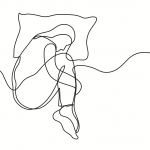 Sadly the impact to my working life was now significant. I was taking time off for the migraines, seeing a consultant and carrying something similar to an epi-pen to inject myself if I felt a migraine coming on. I then had about an hour to get myself home and in bed before I succumbed to the painkiller and slept. My consultant was fantastic, promising me management but not a cure, and I eventually settled on a lifestyle of early nights, no caffeine, minimise stress (my first engagement with mindfulness) and a simple, plain diet.
Sadly the impact to my working life was now significant. I was taking time off for the migraines, seeing a consultant and carrying something similar to an epi-pen to inject myself if I felt a migraine coming on. I then had about an hour to get myself home and in bed before I succumbed to the painkiller and slept. My consultant was fantastic, promising me management but not a cure, and I eventually settled on a lifestyle of early nights, no caffeine, minimise stress (my first engagement with mindfulness) and a simple, plain diet.
At no point was migraine linked to my surgical menopause and the impact of hormone withdrawal, despite this being a common symptom. We did discuss that migraine had always been linked to my menstrual cycle, but there was no suggestion that hormone management might be a suitable path to follow.
 In the meantime, I was trying various herbal and alternative methods for managing the more obvious menopause symptoms of hot flushes, night sweats and mood swings. I was persistent, consistent, optimistic and unsuccessful. I really wanted them to work, but even the placebo effect did not work for me. I continued to struggle on without any help or support from the medical profession when each of the ‘new’ therapies didn’t work. It was hit and miss on so many things and although my doctor was sympathetic, she was unable to suggest anything and certainly no referral to an expert in menopause and hormone imbalance.
In the meantime, I was trying various herbal and alternative methods for managing the more obvious menopause symptoms of hot flushes, night sweats and mood swings. I was persistent, consistent, optimistic and unsuccessful. I really wanted them to work, but even the placebo effect did not work for me. I continued to struggle on without any help or support from the medical profession when each of the ‘new’ therapies didn’t work. It was hit and miss on so many things and although my doctor was sympathetic, she was unable to suggest anything and certainly no referral to an expert in menopause and hormone imbalance.
In the next couple of years I began to experience a whole new set of symptoms – numbness and tingling in my extremities was first. An MRI later and it was established that I did not have a neurological disease. ![]() It was unexplained and once again, no suggestion of hormonal imbalance following surgical menopause. I was left with an “oh dear, not sure what that is, well its nothing we know about so its probably ok.”
It was unexplained and once again, no suggestion of hormonal imbalance following surgical menopause. I was left with an “oh dear, not sure what that is, well its nothing we know about so its probably ok.”
Joint pain and muscle weakness came next, but it’s “not anything we can identify” so again, “probably ok.” No suggestion that this was potentially related to hormonal imbalance following surgical menopause.
Another period of numbness and pain, coupled with extreme fatigue and dizziness, another MRI, still not multiple sclerosis, still not sure what it is, but we know what is it not.
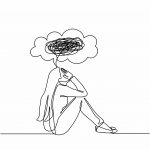 Unsurprisingly I was feeling even lower than ever, depression was not far away, anxiety and self doubt were galloping through my mind and my capacity to cope with everyday things was shot, everything was insurmountable.
Unsurprisingly I was feeling even lower than ever, depression was not far away, anxiety and self doubt were galloping through my mind and my capacity to cope with everyday things was shot, everything was insurmountable.
By this time I had, like so many other women before and since, decided that I was too unwell to continue in my career as a senior manager in IT. Unable to continue in the high pressure environment of senior management due to brain fog, anxiety, self doubt and of course, the constant poor health issues, I retrained at my own expense and became self employed. At least that way, I was my own boss and I could reduce my working week.
A 2019 survey — released in May — conducted by BUPA and cited by the Chartered Institute of Personnel and Development, or CIPD, a London-based association for human resource management professionals, reckoned almost 900,000 women in the U.K. left their jobs over an undefined period of time because of menopausal symptoms.
Only six months after I had left the organisation, they were asking me to come back and do some consultancy full time, which I had to decline given the pressure I knew I would be experiencing. If only support for my menopausal symptoms had been available, maybe my organisation would have been able to continue to benefit from my expertise.
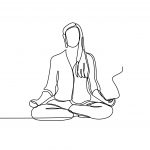
And time to pause again – I start a new job, my migraines are under control (-ish) and my menopause symptoms continue. I don’t have multiple sclerosis, I don’t have fibromyalgia, I don’t have a neurological disease and I don’t have a high flying career. My new health insurance (essential for the self employed) excluded treatment for migraine, multiple sclerosis and any other neurological disorder as “existing conditions” … no mention that these were in fact the result of a perfectly natural bodily change which affects every women.
I have, however, discovered the benefits of mindfulness, awareness and meditation. It’s not all bad …
